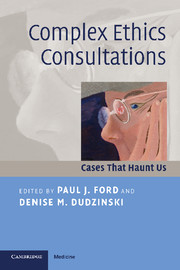Book contents
- Frontmatter
- Contents
- List of contributors
- Foreword
- Acknowledgments
- Introduction: Live and learn: courage, honesty, and vulnerability
- Part I Starting at the beginning: prenatal and neonatal issues
- Part II The most vulnerable of us: pediatrics
- Part III Diversity of desires and limits of liberty: psychiatric and psychological issues
- Part IV Withholding therapy with a twist
- Part V The unspeakable/unassailable: religious and cultural beliefs
- Part VI Human guinea pigs and miracles: clinical innovations and unorthodox treatment
- Part VII The big picture: organizational issues
- 25 It's not my responsibility
- 26 Intra-operative exposure to sporadic Creutzfeldt-Jakob disease: to disclose or not to disclose
- 27 Why do we have to discharge this patient?
- 28 Who's that sleeping in my bed? An institutional response to an organizational ethics problem
- Conclusions, educational activities, and references
- Index
25 - It's not my responsibility
Published online by Cambridge University Press: 03 May 2010
- Frontmatter
- Contents
- List of contributors
- Foreword
- Acknowledgments
- Introduction: Live and learn: courage, honesty, and vulnerability
- Part I Starting at the beginning: prenatal and neonatal issues
- Part II The most vulnerable of us: pediatrics
- Part III Diversity of desires and limits of liberty: psychiatric and psychological issues
- Part IV Withholding therapy with a twist
- Part V The unspeakable/unassailable: religious and cultural beliefs
- Part VI Human guinea pigs and miracles: clinical innovations and unorthodox treatment
- Part VII The big picture: organizational issues
- 25 It's not my responsibility
- 26 Intra-operative exposure to sporadic Creutzfeldt-Jakob disease: to disclose or not to disclose
- 27 Why do we have to discharge this patient?
- 28 Who's that sleeping in my bed? An institutional response to an organizational ethics problem
- Conclusions, educational activities, and references
- Index
Summary
Case narrative
As chair of the ethics committee, I (RAP) received a phone call from a second-year cardiology research fellow requesting advice about a vexing case. She asked the following question:
What are the ethical considerations in a case in which a resident moonlighting at a freestanding urgent-care clinic ignored the fellow's interpretation of an EKG showing an acute heart attack and treated a patient with shortness of breath for possible pneumonia? When the patient returned to the clinic the following day because of worsening symptoms, the resident sent the patient to the hospital without the initial EKG. The patient died shortly after admission.
I asked the fellow to tell me more about the case. She reported that a 68-year-old patient with a host of chronic medical problems including emphysema, diabetes, and congestive heart failure went to an urgent-care clinic for evaluation of increased difficulty in breathing. A moonlighting resident examined the patient and ordered an EKG, chest X-ray, and lab tests. The resident interpreted the EKG as clinically insignificant and thought that the chest X-ray showed findings consistent with the patient's emphysema. The resident also noted what appeared to be a possible infection behind the heart. Laboratory tests showed a mildly elevated white blood cell count, but no tests were ordered to rule out a heart attack. The resident diagnosed a possible pneumonia, prescribed antibiotics, and told the patient to return if his symptoms did not improve.
The resident, a trainee at a local medical center, worked in freestanding urgent care clinics during off-hours with a business partner who was an internal medicine fellow.
- Type
- Chapter
- Information
- Complex Ethics ConsultationsCases that Haunt Us, pp. 197 - 204Publisher: Cambridge University PressPrint publication year: 2008



